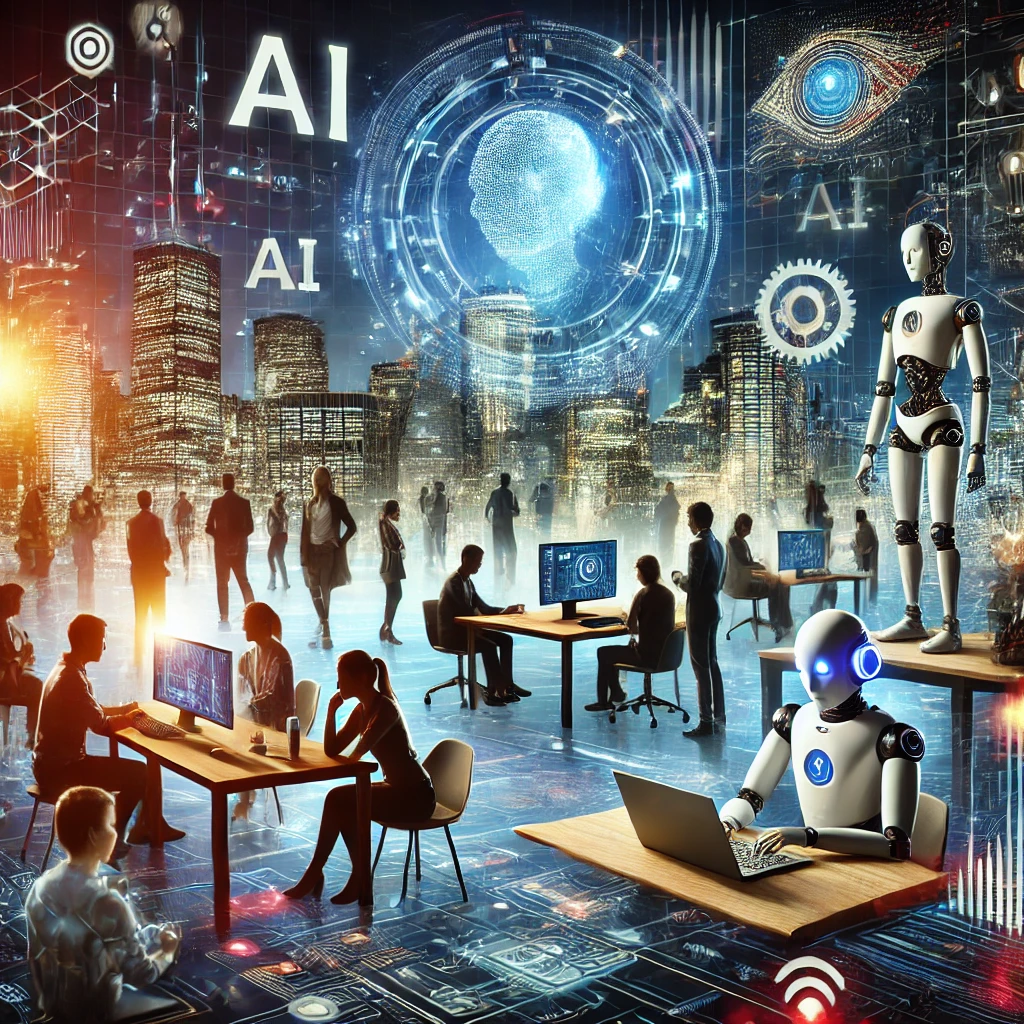
Artificial intelligence is transforming the startup landscape, offering new possibilities across industries. Companies leveraging AI are not only streamlining processes but also creating entirely new business models. From automation to predictive analytics, AI-driven startups are gaining momentum at an unprecedented rate.
The integration of AI technologies allows businesses to enhance decision-making, optimize resource allocation, and personalize customer experiences. As competition intensifies, startups that effectively utilize AI can gain a strategic edge over their industry counterparts.
1. The Growing Influence of AI in Startups 📊
Expansion Across Multiple Sectors
AI is no longer limited to tech-heavy industries. Startups in healthcare, finance, education, e-commerce, and entertainment are integrating AI to improve efficiency and develop innovative solutions.
- Healthcare: AI-powered diagnostics, robotic surgeries, and personalized medicine are redefining patient care.
- Finance: Fraud detection, risk assessment, and algorithmic trading are driving financial decision-making.
- E-commerce: Smart recommendation engines and chatbots enhance customer engagement.
- Education: AI-assisted learning platforms personalize content based on student performance.
- Marketing: Automated content creation, sentiment analysis, and AI-driven advertising boost campaign performance.
Investment and Market Growth
Venture capital firms are heavily investing in AI startups, recognizing their potential to disrupt traditional business models. The global AI startup ecosystem has experienced significant funding surges, leading to rapid innovation and scaling opportunities.
- The AI market is projected to exceed $500 billion by 2030.
- More than 50% of startups incorporate AI-driven technology.
- AI unicorns (startups valued over $1 billion) are increasing in number, with major acquisitions by tech giants.
2. Core AI Technologies Driving Innovation ⚡
Machine Learning and Data Analytics
Startups are using machine learning models to analyze vast amounts of data and generate actionable insights. Algorithms improve over time, refining predictions and enhancing decision-making processes.
- Predictive analytics helps businesses anticipate customer needs and market trends.
- Automated decision-making optimizes operations by minimizing human intervention.
- Anomaly detection identifies fraud, cybersecurity threats, and operational inefficiencies.
Natural Language Processing (NLP)
NLP enables machines to understand and process human language. AI-driven startups are utilizing NLP for chatbots, virtual assistants, sentiment analysis, and content summarization.
- Conversational AI improves customer interactions.
- Language translation tools facilitate global business communication.
- AI-generated content accelerates marketing and journalism efforts.
Computer Vision and Robotics
AI-powered image and video recognition technology are revolutionizing industries such as healthcare, security, and retail.
- AI-assisted medical imaging improves diagnostic accuracy.
- Autonomous delivery drones optimize logistics operations.
- Facial recognition technology enhances security measures.
AI in Cybersecurity
Startups are integrating AI into cybersecurity frameworks to detect and respond to threats in real-time. AI models can identify unusual behavior, analyze patterns, and prevent cyberattacks.
- Threat intelligence platforms use AI to mitigate security risks.
- Automated malware detection enhances system protection.
- AI-powered authentication strengthens access control measures.
3. AI’s Role in Enhancing Business Efficiency 🏆
Automating Repetitive Tasks
One of AI’s most significant contributions is automating manual and repetitive processes, allowing startups to focus on innovation and strategy.
- HR and recruitment automation streamlines candidate screening.
- AI-powered supply chain optimization reduces delays and improves inventory management.
- AI-driven document processing enhances workflow efficiency.
Improving Customer Experience
AI is enabling startups to provide personalized and seamless customer experiences by leveraging real-time data.
- Personalized recommendations increase user engagement and conversions.
- AI-driven customer support chatbots provide instant solutions.
- Voice recognition technology improves accessibility for diverse users.
Data-Driven Decision Making
Startups utilizing AI-driven analytics can optimize decision-making processes by analyzing patterns and predicting outcomes.
- Marketing optimization ensures budget efficiency through AI-driven campaign analysis.
- Predictive maintenance minimizes equipment failures by analyzing usage data.
- Real-time performance tracking enhances operational transparency.
4. The Competitive Edge for Startups Using AI 📈
Faster Product Development
AI allows startups to develop, test, and deploy products at an accelerated pace. Automated coding, design tools, and AI-assisted debugging streamline development cycles.
Cost Reduction and Scalability
Startups leveraging AI can reduce overhead costs and scale their businesses efficiently. Cloud-based AI services make it easier to integrate advanced capabilities without significant infrastructure investments.
- Cloud-based AI solutions eliminate the need for expensive on-premise setups.
- Subscription-based AI services provide scalable pricing models.
- AI-powered automation reduces reliance on human labor for repetitive tasks.
Innovation in Business Models
AI enables startups to explore new revenue streams and business models that were previously unattainable.
- AI-powered marketplaces use algorithms to match buyers and sellers.
- Subscription-based AI analytics platforms provide insights as a service.
- AI-driven content creation platforms generate media, design, and advertising assets.
5. AI Adoption Challenges for Startups 🛠️
Limited Access to High-Quality Data
AI models require large amounts of high-quality data to function effectively. Startups often face challenges in obtaining, cleaning, and labeling datasets.
- Data scarcity limits model accuracy and effectiveness.
- Privacy concerns create regulatory hurdles in data collection.
- Bias in training data can lead to ethical concerns and skewed AI decisions.
Regulatory and Compliance Issues
Startups must navigate complex regulations surrounding AI, data privacy, and security.
- GDPR and CCPA regulations impose strict data protection laws.
- AI ethics guidelines require transparency in automated decision-making.
- Industry-specific compliance standards dictate AI deployment in healthcare, finance, and other fields.
High Development Costs
Developing and deploying AI models require substantial financial resources.
- Computational costs for training deep learning models are high.
- Skilled AI professionals demand competitive salaries.
- Continuous AI updates require ongoing investment in R&D.
6. The Future of AI-Powered Startups 🔮
AI Democratization
As AI technology becomes more accessible, even non-tech startups can integrate AI-driven solutions. Open-source frameworks, low-code AI platforms, and cloud-based AI services are lowering barriers to entry.
- No-code AI tools enable businesses to deploy AI without extensive technical knowledge.
- Cloud-based AI solutions provide cost-effective computing power for startups.
- AI-as-a-service models allow businesses to use AI on a subscription basis, eliminating upfront costs.
Hyper-Personalization
AI is shifting towards highly personalized experiences, allowing businesses to tailor products and services to individual users.
- E-commerce – AI-powered recommendation engines suggest products based on user behavior.
- Healthcare – AI models analyze patient data to offer personalized treatment plans.
- Marketing – AI-driven content creation generates personalized ads and campaigns.
AI and Sustainability
Startups are leveraging AI to address environmental challenges, making AI an essential tool for sustainable innovation.
- Energy optimization – AI enhances power grid efficiency and reduces energy consumption.
- Smart agriculture – AI-driven predictive analytics optimize farming techniques to reduce waste.
- Climate monitoring – AI analyzes environmental data to track climate change and natural disasters.
The Evolution Towards Artificial General Intelligence (AGI)
While current AI models focus on narrow tasks, the long-term goal is to develop Artificial General Intelligence (AGI)—AI systems capable of reasoning, problem-solving, and learning across multiple domains.
- Self-learning AI – Future AI systems may autonomously improve without human intervention.
- Advanced human-AI collaboration – AI could work alongside humans in complex decision-making.
- Ethical considerations – As AI becomes more advanced, regulating AGI will become a critical global issue.
7. Best Practices for AI Startups 🏆
Ethical AI Development
Building AI responsibly from the start is crucial for long-term success. Key considerations include:
- Transparency – Clearly explaining how AI models make decisions.
- Bias mitigation – Using diverse datasets and fairness-testing tools to eliminate bias.
- Regulatory alignment – Ensuring compliance with global AI ethics standards.
Prioritizing Data Security
With data at the core of AI development, startups must implement robust security measures to protect user information.
- End-to-end encryption – Securing data transfers and storage.
- Regular security audits – Identifying vulnerabilities before they become risks.
- Compliance with privacy laws – Avoiding legal pitfalls by adhering to data protection regulations.
Human-AI Collaboration
Instead of replacing human workers, AI should complement human decision-making to enhance productivity.
- AI-assisted decision-making – AI models provide insights, but humans retain control over final decisions.
- Human-in-the-loop systems – Continuous human oversight ensures ethical AI operations.
- AI-powered automation – Reducing repetitive tasks to allow employees to focus on creative and strategic roles.
Scalability and Adaptability
Startups must design AI solutions that can scale across industries and markets.
- API-driven AI models – Allow seamless integration with various business platforms.
- Modular AI architecture – Enabling easy updates and feature expansions.
- Cross-industry applications – Adapting AI models for different sectors to maximize growth potential.
Conclusion 🎯
AI-powered startups are redefining industries, enhancing efficiency, and unlocking new business opportunities. Overcoming challenges such as data privacy, high development costs, and regulatory compliance is crucial for long-term success.
By embracing ethical AI development, prioritizing security, and fostering human-AI collaboration, startups can build scalable and responsible AI solutions. As AI continues to evolve, companies that innovate while adhering to best practices will lead the next wave of technological advancement.




